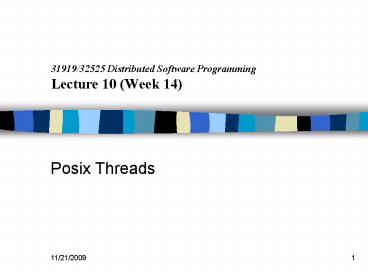3191932525 Distributed Software Programming Lecture 10 Week 14 - PowerPoint PPT Presentation
1 / 10
Title:
3191932525 Distributed Software Programming Lecture 10 Week 14
Description:
... 14/09. 1. 31919/32525 Distributed Software Programming. Lecture 10 (Week 14) Posix Threads. 11/14/09. 2. Outline. Disadvantages of Using fork() Advantages of Using ... – PowerPoint PPT presentation
Number of Views:19
Avg rating:3.0/5.0
Title: 3191932525 Distributed Software Programming Lecture 10 Week 14
1
31919/32525 Distributed Software
ProgrammingLecture 10 (Week 14)
- Posix Threads
2
Outline
- Disadvantages of Using fork()
- Advantages of Using Threads
- Basic Thread Functions
3
Problems with fork()
- fork is expensive
- Memory is copied to child
- All fds are duplicated in the child.
- Need IPC to pass information between the parent
and child after the fork.
4
Features of Threads
- Threads share
- the same global variables
- process instructions
- most data
- open files
- signal handlers and signal dispositions
- current working directory
- user and group IDs
5
pthread_create Function
- Initial or main thread is created by exec.
- Additional threads are created by
- int pthread_create(pthread_t tid, const
pthread_attr_t attr, void (func)(void ), void
arg) - Thead has attributes priority, stack size etc
- Thread specifies a function to execute
- arg is the single argument to the function
- On success, pthread_create returns 0 and a thread
is created. Otherwise a positive value is
returned.
6
Start Function of a Thread
- If multiple arguments are needed, the arguments
are packaged into a data structure. - The function takes only a single argument.
- The argument is a generic pointer pointing to the
data structure. - The function returns a generic pointer.
7
pthread_join Function
- One can wait for a given thread to terminate by
calling - int pthread_join(pthread_t tid, void status)
- tid specifies the thread to be waited for
- If the status pointer is not NULL, the return
value from the thread function is stored in the
location pointed by status - pthread_join returns 0 on success, and a positive
value on failure.
8
Joinable Thread and Detached Thread
- Joinable threads ID and status are retained when
the thread terminates until another thread calls
pthread_join. - Detached threads resources are released when the
thread terminates. - By default, a thread is joinable.
- To change from joinable to detached thread, use
- int pthread_detach (pthread_t tid)
9
Other Basic Functions
- One way for a thread to terminate is to call
- void pthread_exit (void status)
- status must not point to an object that is local
to the calling thread. - Another two ways for a thread to terminate
- The thread function returns
- The main() function calls exit().
- A thread fetches its own ID by calling
- pthread_t pthread_self (void)
10
Readings
- Stevens, UNIX Network Programming, Volumn 1 (2nd
Edition) - Chapter 23































